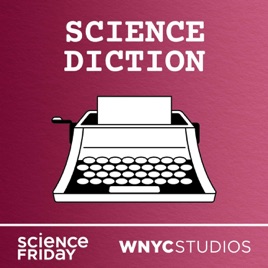
Advertise on podcast: Science Diction
Rating
4.7 from
Country
This podcast has
43 episodes
Language
Publisher
Explicit
No
Date created
2020/02/28
Average duration
17 min.
Release period
66 days
Description
What does the word “meme” have to do with evolutionary biology? And why do we call it “Spanish flu” when it was never Spanish? Science Diction is a podcast about words—and the science stories within them. If you like your language with a side of science, Science Diction has you covered. Brought to you by Science Friday and WNYC Studios.
Social media
Check Science Diction social media presence
Podcast episodes
Check latest episodes from Science Diction podcast
New Show: Universe of Art
2023/08/07
Science Friday’s new podcast about science-inspired art is out now!
Saying Goodbye To Science Diction
2022/04/05
Dear Science Diction listeners,
It is with sadness that we announce the finale of the Science Diction podcast. Starting with a simple newsletter and a passionate audience, the Science Diction podcast grew to serve up episodes on topics as varied as meme, ketchup, and juggernaut. It has been a joy to share these stories with you for the last two years. In celebration of Science Diction, we are sharing with you now a final mini-episode, a look back on this labor of love. You can relisten and read past editions of Science Diction anytime by visiting www.sciencefriday.com/ScienceDiction. If you find yourself longing for more science esoterica, we invite you to join us at our weekly trivia nights. Hosted by Diana Montano and a variety of guest experts, they are a free, and absolutely nerdy, delight.
On behalf of Johanna, Elah, and everyone that has contributed to making Science Diction, thank you for listening!
more
American Chestnut: Resurrecting A Forest Giant
2021/12/21
We have a favor to ask! We want to know more about what you like, what you don’t, and who you are—it’ll help us make better episodes of Science Diction. Please, take our brief survey. Thank you!
At the turn of the 20th century, the American chestnut towered over other trees in Eastern forests. The trees would grow as much as 100 feet high, and 13 feet wide. According to legend, a squirrel could scamper from New England to Georgia on the canopies of American chestnuts, never touching the ground.
And then, the trees began to disappear, succumbing to a mysterious fungus. The fungus first appeared in New York City in 1904—and then it spread. By the 1950s, the fungus had wiped out billions of trees, and effectively finished off the American chestnut.
Now, some people are trying to resurrect the American chestnut—and soon. But not everyone thinks that’s a good idea.
Guests:
Sara Fitzsimmons is Director of Restoration, North Central Regional Science Coordinator, and Regional Science Coordinator Supervisor at the American Chestnut Foundation.
Susan Freinkel is the author of American Chestnut: The Life, Death, and Rebirth of a Perfect Tree.
Neil Patterson Jr. works at the Center for Native Peoples and the Environment at SUNY, and is a member of the Tuscarora Nation.
Bart Chezar is a chestnut enthusiast, and volunteers with the Prospect Park Alliance.
Footnotes & Further Reading:
Listen to oral histories from people who grew up with the American chestnut.
Credits:
This episode of Science Diction was produced by Shahla Farzan and Johanna Mayer. Elah Feder is our Editor and Senior Producer. Daniel Peterschmidt is our composer, and they sound designed this episode. Lauren J. Young contributed research, and Danya AbdelHameid fact checked the episode. Our Chief Content Officer is Nadja Oertelt.
more
Vocal Fry: Why I’m Not Getting A Voice Coach
2021/12/07
For decades, vocal fry lived a relatively quiet existence. It was known to linguists, speech pathologists and voice coaches, but everyday people didn’t pay much attention to it. But then in 2011, people started noticing it everywhere. So what happened? What is vocal fry? Why does host Johanna Mayer use it? What's her problem? And is it really that bad?
Guest:
Lisa Davidson is the chair of the Linguistics Department at NYU.
Footnotes & Further Reading:
Check out this article on young women as linguistic trendsetters.
Read the full study from 2011.
Learn more about people’s negative reactions to vocal fry.
Credits:
This episode was produced with Kevin McLean, along with Johanna Mayer. Elah Feder is our Editor and Senior Producer. Daniel Peterschmidt is our Composer, and they sound designed and mastered the episode. Nadja Oertelt is our Chief Content Officer.
more
Juggernaut: Indian Temple Or Unstoppable Force?
2021/11/23
In 2014, a grad student in Kolkata named Ujaan Ghosh came across an old book by a Scottish missionary. And as Ghosh paged through the book, he noticed the missionary kept using a word over and over: Juggernaut. But the missionary wasn’t using it the way we do today—to mean an unstoppable, overwhelming force. He was using it to talk about a place: a temple in Puri, India. So Ghosh dug further, and as he grasped the real story of where the English word, juggernaut, had come from, he realized there was just no way he could keep using it.
A transcript of this episode is being processed and will be available within a week.
Guests:
Chris Egusa is an audio producer and 2020 KALW Audio Academy fellow.
Dylan Thuras is co-founder of Atlas Obscura, and host of the Atlas Obscura podcast.
Ujaan Ghosh is a PhD candidate at the University of Wisconsin-Madison.
Footnotes & Further Reading:
Read Ujaan Ghosh’s article on the origins of the word “juggernaut.”
Learn more about Jagannath Temple in Atlas Obscura.
Listen to more episodes of the Atlas Obscura podcast.
Credits:
This episode was a collaboration between Science Diction and Atlas Obscura. It was produced by Johanna Mayer and Chris Egusa, and edited by Elah Feder and John DeLore. Daniel Peterschmidt is our composer, and Danya AbdelHameid fact checked the episode. It was mixed by Luz Fleming.
more
Jargon: We Love To Hate It
2021/11/02
Head on over to plainlanguage.gov, and you’ll find a helpful table, dedicated to simplifying and demystifying military jargon. On one side of the table, there’s the jargon term, and on the other, its plain language equivalent. “Arbitrarily deprive of life”? Actually just means “kill people.” “Render nonviable”? Also means “kill people.” “Terminate with extreme prejudice”? “Kill people.”
This table is just one of many resources on plainlanguage.gov—from checklists to plain language training to thesauruses. The website was created by an unfunded government group of plain language activists who make it their mission to translate government communications into regular old, plain language.
But jargon isn’t just a government problem. It pops up in nearly every field, and it seems like it annoys most of us. So why do we use it? And is there anything actually good about it? This episode was inspired by a question from a listener, Jafar, who asked about the word “recrudescence” and why we tend to use fancy words when simple ones would work just fine. If you have a question about a word or phrase, leave us a voicemail! The number is 929-499-WORD, or 929-499-9673. Or, you can always send an email to podcasts@sciencefriday.com.
Guests:
Joe Kimble is a plain language advocate and professor emeritus at WMU-Cooley Law School.
David Lipscomb is Director of the Writing Center at Georgetown University, and Vice Chair of the Center for Plain Language.
Alejandro Martínez García is a researcher at the National Research Council in Italy.
Footnotes & Further Reading:
For a challenge, try to explain science using only 1,000 of the most common words.
For all your plain language writing needs, take a look at plainlanguage.gov.
Learn more about the history of the plain language movement in the United States.
Read a study on how our brains react to concrete vs. abstract language.
Read more about how jargon affects citations in scientific papers.
Credits:
This episode was produced by Johanna Mayer and Senior Producer and Editor Elah Feder. Daniel Peterschmidt is our composer. Nadja Oertelt is our Chief Content Officer. Special thanks to Jana Goldman, Bill Lutz, and especially Karen Schriver for background information on the plain language movement.
more
Algebra: From Broken Bones To Twitter Feuds
2021/10/19
When high schooler Gracie Cunningham posted a TikTok asking where algebra came from, she probably didn’t expect to become a viral sensation. There were the usual Twitter trolls, but some unexpected voices also began piping up, causing a flurry in the math world.Thank you to Chad, the listener who suggested that we do an episode on algebra. If you have a suggestion for a word or episode, leave us a voicemail. The number is 929-499-WORD, or 929-499-9673. Or, you can always send an email to podcasts@sciencefriday.com.
Guests:
Steven Strogatz is a Professor of applied mathematics at Cornell, and Visiting Professor at National Museum of Mathematics.Eugenia Cheng is a mathematician and Scientist in Residence at the School of the Art Institute of Chicago, and the author of x + y: A Mathematician’s Manifesto for Rethinking Gender.
Footnotes & Further Reading:
Read Eugenia Cheng’s full response to Gracie. Take a peek at al-Khwarizmi’s The Compendious Book on Calculation by Completion and Balancing.
Credits:
This episode was produced by Johanna Mayer and Lauren Young. Our Editor and Senior Producer is Elah Feder. Daniel Peterschmidt is our Composer. Danya AbdelHameid contributed fact checking. Our Chief Content Officier is Nadja Oertelt.
more
Hurricane
2021/09/28
CORRECTION: In this episode, we say that there were only two names left on the 2021 list of Atlantic hurricane names until we resume use of the Greek alphabet letters. In March 2021, the World Meteorological Association decided to end the use of the Greek alphabet, and provided a list of supplementary names instead.
This episode is a re-broadcast. It originally aired in November 2020.
Every year, the World Meteorological Organization puts out a list of 21 names for the season’s hurricanes and tropical storms. But in 2020, the Atlantic hurricane season was so active that by September, we'd flown through the whole list of names and had to switch to the Greek alphabet. Thus, Hurricane Iota became the 30th named storm of the season.
We’ve only had to dip into the Greek alphabet once before, in 2005. But the practice of naming hurricanes goes back to the 19th century, and it was a bumpy ride to land on the system we use today. In this episode: The story of a meteorologist in Australia, a novel, and a second-wave feminist from Florida—and how they brought us hurricane names.
Guests:
Christina M. Gonzalez is a doctoral candidate in anthropology at the University of Texas at Austin.Liz Skilton is a historian and the author of Tempest: Hurricane Naming and American Culture.
Footnotes & Further Reading:
For more hurricane history, check out A Furious Sky: The Five-Hundred-Year History of America's Hurricanes by Eric Jay Dolin.
To learn more about Roxcy Bolton and the fight to change the naming system, read Liz Skilton’s article “Gendering Natural Disaster: The Battle Over Female Hurricane Names.”
Credits:
Science Diction is hosted and produced by Johanna Mayer. Our editor and Senior Producer is Elah Feder. We had story editing from Nathan Tobey, and fact checking by Michelle Harris. Our composer is Daniel Peterschmidt. Chris Wood did sound design and mastered the episode. Special thanks to the Florida State Library & Archives for allowing us use footage from Roxcy Bolton’s oral history interview. Nadja Oertelt is our Chief Content Officer.
more
Knock On Wood And Tsunami
2021/09/14
Journalists Kevin McLean and Shalina Chatlani join us for a round of Diction Dash, where Johanna tries - and usually fails - to guess the true meaning or origin of a word. If you’re curious about a word, get in touch! Give us a call, leave a message, and we might play it on the show. The number is 929-499-WORD, or 929-499-9673. Or, you can always send an email to podcasts@sciencefriday.com.
Guests:
Kevin McLean is a producer at the Science Communication Lab.Shalina Chatlani is the health care reporter for the Gulf States Newsroom.
Footnotes & Further Reading:
Read the full study on the link between a desire for control, and reliance on superstitions under stress.
Credits:
This episode was produced by Daniel Peterschmidt, Johanna Mayer, and Senior Producer Elah Feder. Daniel Peterschmidt is our composer and mastered this episode. We had fact checking help from Robin Palmer. Nadja Oertelt is our Chief Content Officer.
more
The Rise Of The Myers-Briggs, Chapter 3: What Is It Good For?
2021/08/31
When Isabel Briggs Myers imagined that her homegrown personality test would change the world, she couldn’t have pictured this. Today, millions take the Myers-Briggs Type Indicator each year. Countless organizations use it, from General Motors to the CIA. But there’s one field that mostly rolls its eyes at the test: psychology.
In our final chapter, Isabel rescues her indicator from the verge of extinction, but has to make some compromises. And we explore what the Myers Briggs does (and doesn’t) measure, and why people love it despite psychologists' complaints.
Listen to Chapter 1 and Chapter 2 of this series.
Guests:
Merve Emre is a writer and English professor at the University of Oxford.
Annie Murphy Paul is a science journalist and author.
Dan McAdams is a professor of psychology at Northwestern University.
Quinisha Jackson-Wright is a writer and the author of Working Twice as Hard.
Jeffrey Hayes is the President and CEO of the Myers-Briggs Company.
Rich Thompson is Senior Director of Global Research at The Myers-Briggs Company.
Peter Geyer is a Myers-Briggs practitioner in Melbourne Australia.
Footnotes & Further Reading:
Check out Merve Emre’s book, The Personality Brokers: The Strange History of Myers-Briggs and the Birth of Personality Testing.
Read Annie Murphy Paul’s book, The Cult of Personality Testing.
Credits:
This episode of Science Diction was produced by Johanna Mayer, Chris Egusa, and Senior Producer Elah Feder. Daniel Peterschmidt is our composer, and they mastered the episode. We had fact checking help from Sona Avakian. Special thanks to Peter Geyer for providing archival audio. Nadja Oertelt is our Chief Content Officer.
more
The Rise Of The Myers-Briggs, Chapter 2: Isabel
2021/08/24
At first, it seemed like Isabel Briggs Myers would have nothing to do with personality typology. That was her mother Katharine’s passion project, not hers. But when Isabel enters a tumultuous marriage, she discovers that her mother’s gospel of type might just be the thing to save it.
In Chapter 2, Isabel picks up her mother’s work, and decides to transform it into a marketable product—but first, she has to convince a group of skeptical PhDs that it actually works. Along the way, one particularly dogged researcher notices some issues with her indicator, threatening to undo everything she’d worked for.
If you’re new to the series, listen to Chapter 1.
Guest:
Merve Emre is a writer and English professor at the University of Oxford.
Footnotes & Further Reading:
Read Merve Emre’s book, The Personality Brokers: The Strange History of Myers-Briggs and the Birth of Personality Testing.
Credits:
This episode was produced by Johanna Mayer, Chris Egusa, and Senior Producer Elah Feder. Our music was composed by Daniel Peterschmidt, who also mastered this episode and helped with archival research. We had fact checking help from Cosmo Bjorkenheim. Peter Geyer provided us with archival audio. Nadja Oertelt is our Chief Content Officer.
more
The Rise Of The Myers-Briggs, Chapter 1: Katharine
2021/08/17
If you’re one of the 2 million people who take the Myers-Briggs Type Indicator every year, perhaps you thought Myers and Briggs are the two psychologists who designed the test. In reality, a mother-daughter team created the test essentially at their kitchen table. In this episode, we look at the unlikely origins of the Myers-Briggs, going all the way back to the late 1800s when Katharine Cook Briggs turned her living room into a “cosmic laboratory of baby training” and set out to raise the perfect child.
In this three-part series, we uncover the strange history of the most popular personality test in the world, and how two women revolutionized personality testing—for better or for worse.
Guest:
Merve Emre is a writer and English professor at the University of Oxford.
Footnotes & Further Reading:
Read Merve Emre’s book, The Personality Brokers: The Strange History of Myers-Briggs and the Birth of Personality Testing.
Credits:
This episode was produced by Johanna Mayer, Chris Egusa, and Elah Feder. Our music was composed by Daniel Peterschmidt, who also mastered the episode. Fact checking by Danya AbdelHameid. Archival audio was provided courtesy of Peter Geyer. Nadja Oertelt is our Chief Content Officer.
more
Podcast reviews
Read Science Diction podcast reviews
Nickname8375
2023/07/20
Wonderful
I really like what you’ve done here. I appreciate the format of 1 word per show with enough story to get into it, but it doesn’t drag on. I don’t find...
more
lagringacabronalameramera
2022/11/28
Vundebar
One of the best shows ever - informative & fun & well done - please come back
Stewartrion
2022/11/20
I miss Science Diction
I really miss the podcast Science Diction! I’m sorry to hear that a few grumpy folks ran you off! Please consider coming back Johanna!
Serenity_7
2022/04/05
Farewell
I’m so sad you guys are leaving, but I’m glad you’re keeping the episodes here for us to hear again. Thank you for all the fun!
ivory Ivy
2021/12/29
The pleasures of time well spent
I love the deep dives into topics that are everyday matters but don’t get air time. Each episode is a delving into curious facts, histories, possibil...
more
Ccsnguyen
2022/02/18
I can’t listen to her voice
I very much would like to listen to this podcast. However I cannot stand the valley-girl voice of the host. Please get a new host.
ghfhgvhgvjhghjnhg
2022/02/01
When are you going to make a new episode!?!?!?!?!
it has been over a month sense you made a new episode! This is my favorite podcast but I can’t wait a over a month for a new episode!!!!!!!!!!!!!!!!!
ICUdoc1
2022/01/22
Fried from vocal fry
I just attempted to listen to this episode. I gave up between 8-9 minutes in. This was exceptionally poorly presented. The presenter didn’t even attem...
more
Juanhooknows
2022/01/16
Intolerable vocal fry
I can’t believe the host was given a green light to publish a self serving, condescending episode defending their lazy intolerable speaking voice. Thi...
more
AK Transplanted
2021/12/30
Stop the Vocal Fry!! Updated
Honestly, I love the content. It’s well-written and engaging. But the host speaks with a vocal fry that makes her sound a little like an adolescent. T...
more
Podcast sponsorship advertising
Start advertising on Science Diction & sponsor relevant audience podcasts
You may also like these science Podcasts
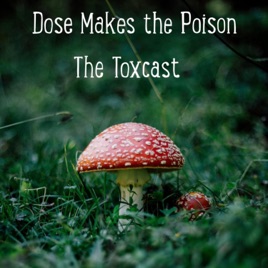
4.8
67
22
Dose Makes The Poison: The Toxcast
Kevin G. Shanks
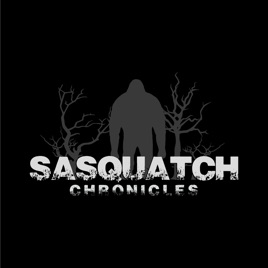
4.8
8217
597
Sasquatch Chronicles
Sasquatch Chronicles - Bigfoot Encounters
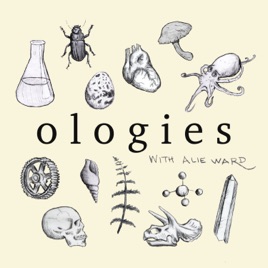
4.9
21221
379
Ologies with Alie Ward
Alie Ward
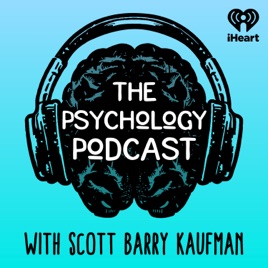
4.4
1648
409
The Psychology Podcast
iHeartPodcasts

4.6
393
233
Quanta Science Podcast
Quanta Magazine
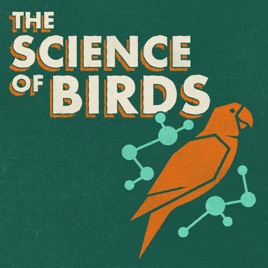
4.8
536
91
The Science of Birds
Ivan Phillipsen
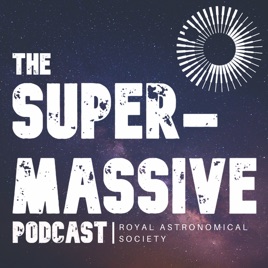
4.6
213
61
The Supermassive Podcast
The Royal Astronomical Society
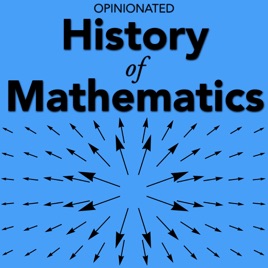
4.5
106
38
Opinionated History of Mathematics
Intellectual Mathematics
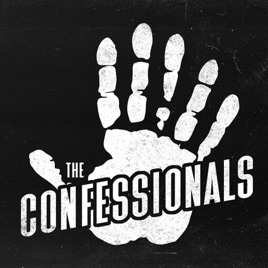
4.6
4955
684
The Confessionals
Merkel Media

4.6
12786
897
StarTalk Radio
Neil deGrasse Tyson




